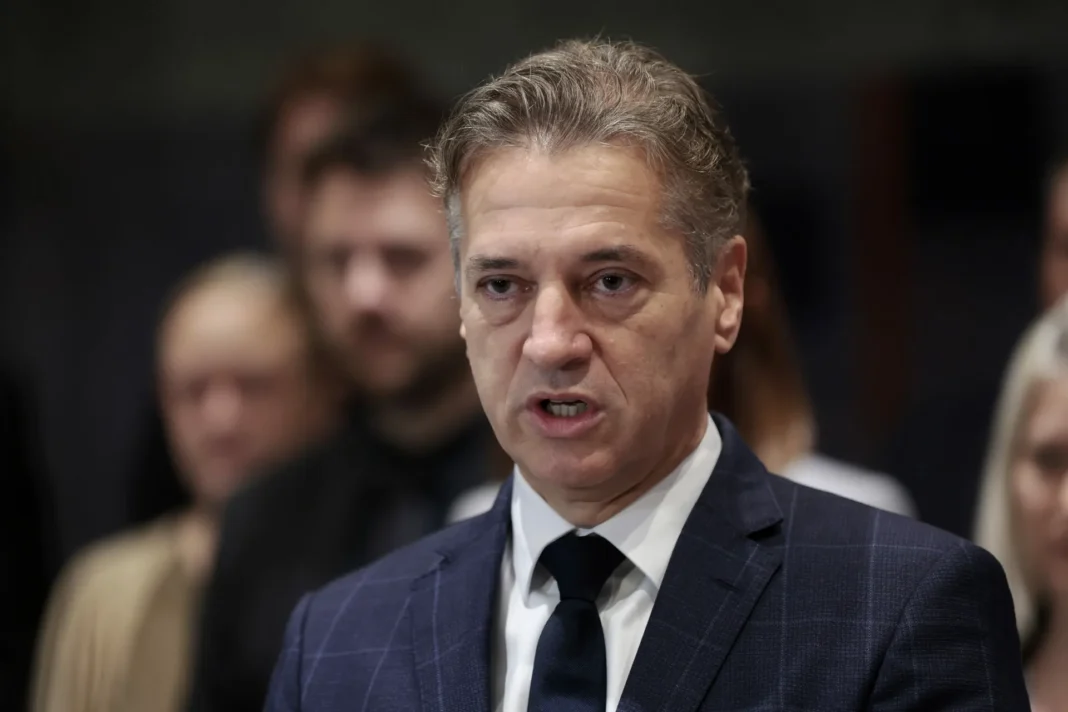By: A. H. (nova24tv.si)
Centres of power are thoroughly implementing the long-anticipated replacement of Prime Minister Robert Golob. Delo, a newspaper owned by transitional tycoon Stojan Petrič, has published the latest public opinion poll by Mediana, which shows Prime Minister Robert Golob plummeting to the very bottom of the popularity rankings among politicians. Support for the Gibanje Svoboda party stands at just 12.4 percent, the lowest it has been so far. Golob has also ended up at the bottom of the popularity rankings among politicians.
It was only a matter of time before the government’s missteps and unfulfilled promises from Prime Minister Robert Golob would take their toll. According to the latest poll by the Mediana institute, that day has arrived, as more than 57 percent of respondents rated the government’s performance negatively.
The newspaper reports that the fiasco surrounding the call for, and then the cancellation of, a consultative referendum on the second block of the nuclear power plant has significantly impacted support for the largest ruling party. Compared to September last year, support for the Gibanje Svoboda has nearly halved (from 24.3 percent), and the difference is even greater compared to December 2022, with current support being just over a third of the 34.1 percent it had at that time, according to Delo.
SDS remains the leading party
SDS remains the leading party with 21.6 percent support (down slightly from 22.4 percent in October). Furthermore, the percentage of respondents who say they would “definitely not” vote for SDS has dropped from 41.9 percent to 38.6 percent. Nearly 26 percent of respondents indicated they would certainly not vote for the Gibanje Svoboda, according to the poll. The SD party is in third place with 6 percent (down from 6.5 percent in October). Among parliamentary parties, only the Levica showed an improvement, with support rising to 5 percent – an increase of 1.4 percentage points from the previous month. NSi (New Slovenia) would receive 4.4 percent of the vote, down from 4.9 percent.
Following them are Vesna with 3.9 percent support, SLS with 3.4 percent, Resni.ca with 2.2 percent, the Pirate Party with 1.2 percent, and Naša prihodnost, Naša dežela, and Konkretno each with 0.2 percent support. The share of undecided voters has also increased, exceeding 30 percent, with over a quarter of respondents unsure of which party they would support, while nearly six percent said they would not vote for any party.
Negative rating for the government’s performance
The government’s performance rating also dropped, from 2.48 in October to 2.26. Only once during this term did the rating go lower, in March (2.23). Over 57 percent of respondents gave the government a negative rating (up from 46.3 percent in October), with 31 percent rating it as very negative, a quarter giving it a neutral rating, and less than 15 percent giving it a positive rating, of which less than two percent rated it as very positive.
Growing support for Janez Janša
The poll also shows that respondents were generally more critical of politicians this month, with nearly all figures receiving lower ratings compared to October. The exception was SDS leader Janez Janša, who moved up seven spots from the bottom of the list to rank 13th.
Prime Minister and Gibanje Svoboda leader Robert Golob experienced a downturn in popularity, receiving the lowest rating from respondents in the latest survey.
Nataša Pirc Musar remains the most popular politician, followed by Economy Minister and SD leader Matjaž Han, European Parliament member Vladimir Prebilič, and now-independent MP Anže Logar. Urška Klakočar Zupančič, the Speaker of the National Assembly, holds fifth place for the third consecutive month. Further down, Levica coordinator and Minister of Culture Asta Vrečko ranks 14th, while NSi leader Matej Tonin is in 16th place.
The survey was conducted by the Institute for Market and Media Research Mediana for Delo between November 4th and 7th, using a representative sample of 722 adult residents of Slovenia.

